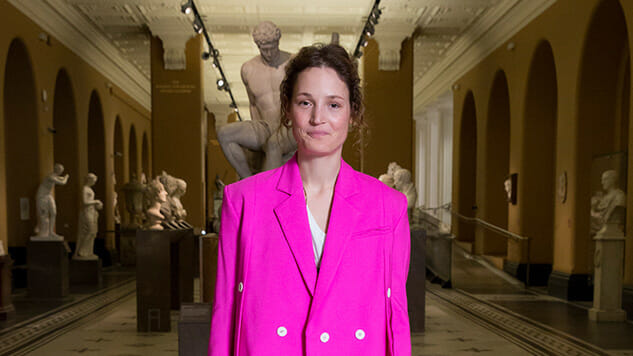Vicky Krieps Talks About What We Don’t Really Talk About
Photos: John Phillips/Getty Images for Universal
In Paul Thomas Anderson’s Phantom Thread, Luxembourgian actress Vicky Krieps plays Alma, a young woman who captures the affections of a powerful, influential man and then spends the rest of the film dwelling in his shadow. In Raoul Peck’s The Young Karl Marx, she plays Jenny von Westphalen, who also captures the attentions of a powerful, influential man and spends the film dwelling in his shadow. The major difference is that Alma is a fictional figure while Jenny was the wife of one Karl Marx, the infamous, revolutionary socialist. If the subject matter doesn’t immediately distinguish one film from the other, then the matter of history certainly does.
What ties them together in spite of their differences is Krieps. Before 2017, American audiences had mostly been deprived of her work. We caught flashes of her in Hanna, or perhaps A Most Wanted Man, but she didn’t take center stage until Phantom Thread opened wide in January. Now we get to see her once more, not quite at center stage but definitely in a role of prominence in Peck’s new film. The Young Karl Marx is determinedly a “great man” story, focused on Marx’s (August Diehl) friendship with Friedrich Engels (Stefan Konarsky), on their efforts to promote the communist cause through both activism and their writing. It’s also about the cost of Marx’s greatness, and who ultimately pays that cost.
Given Phantom Thread’s proximity to The Young Karl Marx, it’s impossible to watch Krieps as Jenny without recalling her work as Alma: They have the same enduring spirit, a quiet indomitability that prevents them from fading into the background, though perhaps that’s just evidence of Krieps’ innate strength as a performer. In Phantom Thread, she has to find the character without the benefit of background. In The Young Karl Marx, she has plenty of background, but a responsibility, too, to Jenny’s memory.
That dichotomy played a central part in Paste’s recent conversation with Krieps, along with her personal connection to Marx and the sobering reality of modern society’s lack of familiarity with Marxist principles.
Paste Magazine: How did you end up getting in touch with [Peck]?
Vicky Krieps: I got in touch with him because he was looking for an actress, obviously, who could speak German and French. So I think this is what brought him to me. I don’t know exactly what he saw of me, but I remember that he or someone from the production sent me the scenes and to me, it was immediately quite clear why they sent them to me. They needed someone who could speak both languages fluently.
And also, what I found straight away—it’s a funny coincidence—is that [Jenny von Westphalen] was from Trier, which was a little German town very close to Luxembourg, actually. As an actor, you’re like, “Why would this particular role need me,” you know? There are so many good actors. I always need to know why is it me this project needs, you know, or why the character need[s] my voice. Here, it was really because I saw she was from Trier, and I thought, “Oh, wow, yes exactly, that’s why, because I’m from Luxembourg. That’s not far away!” [laughs]
Paste: That’s an excellent coincidence. It was meant to be.
Krieps: Yeah, exactly. And also, because of Karl Marx, obviously. My grandfather, who was in the concentration camps as a very young man, I think when he was 21 he got interned—or at 20 or even before, really really young—it was because of Karl Marx, because they found all these books in his house. They were his father’s books, so his father was sentenced straight away, but when he was brought up in front of the Nazi courts, they saw that he was so young, you know? When they started, they were like, “So, Mr. Krieps, so these books you have there, the Karl Marx books, it’s probably your dad who gave them to you, right? They were only in your cupboard because they’re your dad’s, right?” And this was like a leash they were giving him so he could get out of there, to not be sentenced to go to the concentration camps. He then got up in front of the court and said, “No, no. They’re my books.”
Of course, Nazis, they didn’t hate anything more than someone who would deny their helping hand, or whatever they were thinking, and then he went to the camps straight away of course. So that was also a strong connection and reason for me, you know, for my grandfather, to go and play Karl Marx’s wife. It was almost like—I don’t know, how do you call this?
Paste: I would call it fate. It’s perfect.
Krieps: It’s fate and it’s almost like paying justice to someone who was treated in an unjust way.
-

-

-

-

-

-

-

-

-

-

-

-

-

-

-

-

-

-

-

-

-

-

-

-

-

-

-

-

-

-

-

-

-

-

-

-

-

-

-

-








































